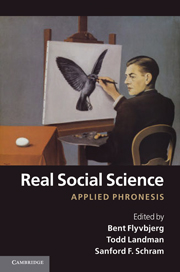Book contents
- Frontmatter
- Contents
- Figures
- Tables
- Contributors
- Acknowledgements
- 1 Introduction: new directions in social science
- Part I Theory and method
- 2 Phronetic social science: an idea whose time has come
- 3 Phronesis and narrative analysis
- 4 The feel for power games: everyday phronesis and social theory
- 5 Phronesis, projects and power research
- Part II Applied phronesis
- 6 Why mass media matter and how to work with them: phronesis and megaprojects
- 7 Power and conflict in collaborative research
- 8 Unsettling a settler society: film, phronesis and collaborative planning in small-town Canada
- 9 Phronesis and critical policy analysis: Heathrow's ‘third runway’ and the politics of sustainable aviation in the United Kingdom
- 10 Amnesty in the age of accountability: Brazil in comparative context
- 11 Feminist phronesis and technologies of citizenship
- 12 Making the teaching of social justice matter
- 13 Spatial phronesis: a case study in geosurveillance
- 14 Important next steps in phronetic social science
- Index
- References
9 - Phronesis and critical policy analysis: Heathrow's ‘third runway’ and the politics of sustainable aviation in the United Kingdom
Published online by Cambridge University Press: 05 June 2012
- Frontmatter
- Contents
- Figures
- Tables
- Contributors
- Acknowledgements
- 1 Introduction: new directions in social science
- Part I Theory and method
- 2 Phronetic social science: an idea whose time has come
- 3 Phronesis and narrative analysis
- 4 The feel for power games: everyday phronesis and social theory
- 5 Phronesis, projects and power research
- Part II Applied phronesis
- 6 Why mass media matter and how to work with them: phronesis and megaprojects
- 7 Power and conflict in collaborative research
- 8 Unsettling a settler society: film, phronesis and collaborative planning in small-town Canada
- 9 Phronesis and critical policy analysis: Heathrow's ‘third runway’ and the politics of sustainable aviation in the United Kingdom
- 10 Amnesty in the age of accountability: Brazil in comparative context
- 11 Feminist phronesis and technologies of citizenship
- 12 Making the teaching of social justice matter
- 13 Spatial phronesis: a case study in geosurveillance
- 14 Important next steps in phronetic social science
- Index
- References
Summary
In recent years, air travel has become increasingly associated in the public domain with a set of negative externalities and frustrations. Where once airports were the symbolic gateways to freedom, modernity and greater economic growth, today they are synonymous with global warming, noise and air pollution, congestion, security checks and delays. Seen against this background, the Labour government's decision in January 2009 to give the go-ahead for a third runway and a sixth terminal at Heathrow Airport was another bold step designed to deal with the issue. But it provoked widespread condemnation, exposed splits in the Cabinet, and triggered another high-profile protest campaign against expansion by local residents, environmental and conservation lobbies, direct action environmentalists, as well as celebrities and even members of the government's own parliamentary majority.
Shortly after its election in May 1997, New Labour had resolved to deal decisively with the historical legacy of incremental planning and ongoing protest in the field of aviation. Accepting the need for firm leadership in this domain, it thus prepared the ground for the development of new legislation that would set out a strategic plan for airports for the next twenty or thirty years. In 2003, a new aviation White Paper, The Future of Air Transport, came down firmly on the side of expanding airport capacity and bolstering the aviation industry (DfT 2003). But rather than setting the conditions for consensual deliberation and rational policy-making, the consultation process and the resultant national plan heightened the antagonisms dividing various stakeholders. In fact, subsequent attempts to implement its plans met with heightened contestation and resistance, especially as this conjuncture coincided with the growing political salience of the dangers of climate change. These dangers prompted the emergence of a broader and more intense climate-change coalition, which managed to construct global civil aviation as an exemplary case of its wider war against productivism. In short, for commentators on both sides of the aviation divide, New Labour singularly failed to achieve authoritative governance (Hajer 2009), either in support of the runway or in leading opposition to expansion. Just days after entering office in May 2010, the Conservative--Liberal-Democrat coalition abandoned New Labour's plans to expand Heathrow Airport, signalling a new round of consultation and policy formulation.
- Type
- Chapter
- Information
- Real Social ScienceApplied Phronesis, pp. 167 - 203Publisher: Cambridge University PressPrint publication year: 2012
References
- 7
- Cited by



